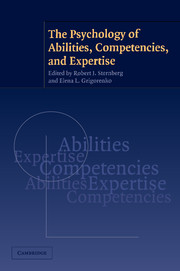Book contents
- Frontmatter
- Contents
- Preface
- List of Contributors
- The Psychology of Abilities, Competencies, and Expertise
- 1 Trait Complexes, Cognitive Investment, and Domain Knowledge
- 2 Intelligence as Adaptive Resource Development and Resource Allocation: A New Look Through the Lenses of SOC and Expertise
- 3 Developing Childhood Proclivities into Adult Competencies: The Overlooked Multiplier Effect
- 4 The Search for General Abilities and Basic Capacities: Theoretical Implications from the Modifiability and Complexity of Mechanisms Mediating Expert Performance
- 5 On Abilities and Domains
- 6 Expertise and Mental Disabilities: Bridging the Unbridgeable?
- 7 The Early Progress of Able Young Musicians
- 8 Expertise, Competence, and Creative Ability: The Perplexing Complexities
- 9 Biological Intelligence
- 10 What Causes Individual Differences in Cognitive Performance?
- Index
- References
7 - The Early Progress of Able Young Musicians
Published online by Cambridge University Press: 05 June 2012
- Frontmatter
- Contents
- Preface
- List of Contributors
- The Psychology of Abilities, Competencies, and Expertise
- 1 Trait Complexes, Cognitive Investment, and Domain Knowledge
- 2 Intelligence as Adaptive Resource Development and Resource Allocation: A New Look Through the Lenses of SOC and Expertise
- 3 Developing Childhood Proclivities into Adult Competencies: The Overlooked Multiplier Effect
- 4 The Search for General Abilities and Basic Capacities: Theoretical Implications from the Modifiability and Complexity of Mechanisms Mediating Expert Performance
- 5 On Abilities and Domains
- 6 Expertise and Mental Disabilities: Bridging the Unbridgeable?
- 7 The Early Progress of Able Young Musicians
- 8 Expertise, Competence, and Creative Ability: The Perplexing Complexities
- 9 Biological Intelligence
- 10 What Causes Individual Differences in Cognitive Performance?
- Index
- References
Summary
DESCRIPTIVE AND THEORETICAL APPROACHES
Many people have strong opinions concerning the possible reasons for particular individuals becoming exceptionally skilled in one or other sphere of excellence, but only rarely are views about this matter accompanied by detailed knowledge of the actual circumstances in which unusual capabilities are gained. When we set out to investigate the early progress of successful young musical instrumentalists in the late 1980s, we began with a firm conviction that it would not be possible to decide between rival theories until a fuller body of descriptive knowledge could be made available. Largely for that reason, our own research has been essentially descriptive. Naturally, we had ideas of our own about the possible roles of various influences, and we were somewhat skeptical about the common belief, firmly held by many musicians, that innate gifts and talents are vital ingredients of excellence at music. In our investigations, however, we have attempted to concentrate on extending descriptive knowledge rather than arguing the merits of alternative theoretical positions. Theorizing, we think, should be preceded by descriptive studies aimed at expanding our knowledge of the phenomena that – eventually – need to be explained. And we are not convinced that a clear distinction can be made between expertise, as revealed by the competence reflected in measures of performance, and broader abilities that take the form of qualities that lie beneath a person's expertise.
- Type
- Chapter
- Information
- The Psychology of Abilities, Competencies, and Expertise , pp. 186 - 212Publisher: Cambridge University PressPrint publication year: 2003
References
- 7
- Cited by

